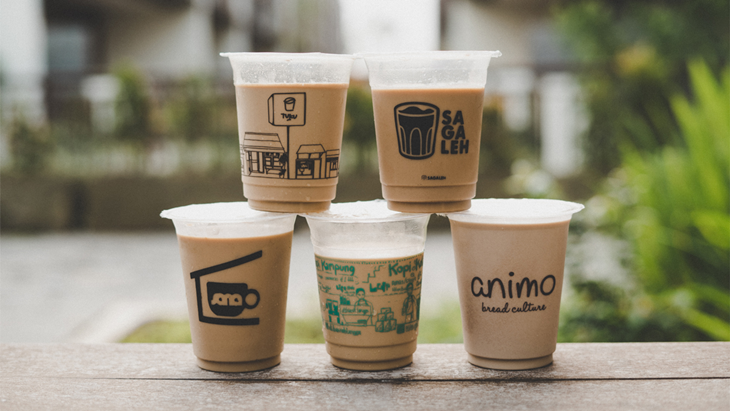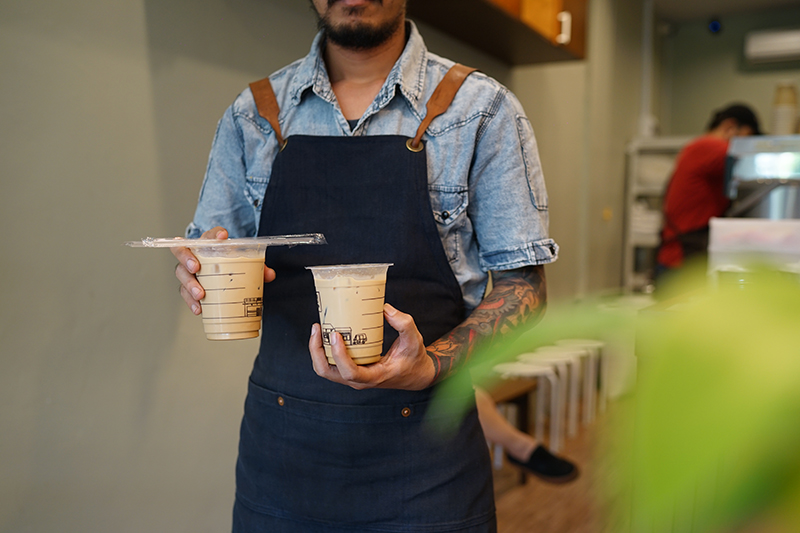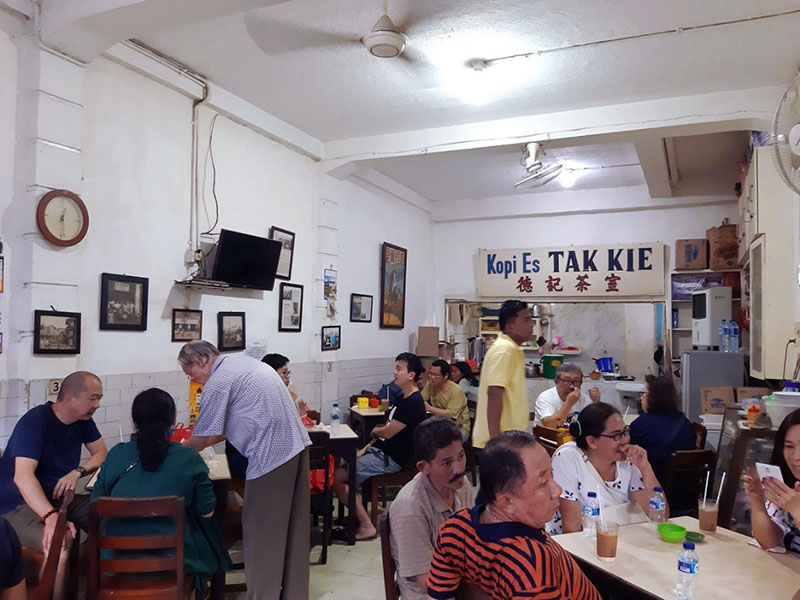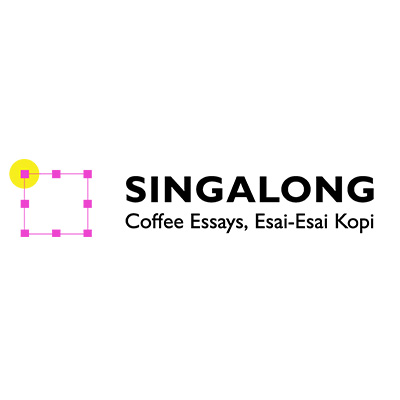Es Kopi Susu: Memodernisasikan Robusta
AULIA MEIDISKA
If you’ve watched TV series Si Doel Anak Sekolahan, you can easily witness the habit of drinking coffee with family and neighbors in the morning and evening. True, this habit of ngopi (drinking coffee) in Indonesia actually begins long time ago. The coffee itself may be slightly burnt or is an instant coffee, and that’s not a problem.
But with the arrival of coffee’s third wave that emphasizes origin and flavor profiles, our lifestyle of ngopi changes. We begin to take closer look at local brands carrying origin Indonesian beans, both as Arabica and Robusta, which are then brewed in various ways. Es kopi susu (iced milk coffee) is one of them. With its low price tag and a range of tantalizing flavors, es kopi susu is the go-to caffeinated drinks.
But what’s the relationship between es kopi susu and Robusta?
In the coffee industry, Robusta is a primary choice if we need a thick and strong bodied coffee to withstand the creamy taste of milk. When mixed together with other ingredients, the bitter taste of Robusta coffee will be balanced by the added flavors, unlike Arabica that has its own sweetness which should be highlighted instead. Besides being widely used in milk coffee, mixing Robusta with Arabica for espresso blends is also a common practice for various coffee shops, both specialty and non-specialty.
Maintaining consistency of taste is also very easy if we use Robusta. In contrast to the more complex Specialty Arabica, which is greatly affected by processing types and roasting level, and often comes from micro-lots, consistency is a challenge. And consistency is very important if we’re talking hundreds (or even thousands) of es kopi susu a day. With Robusta production in Indonesia reaches more than 600,000 tons per year, Robusta is a safe choice for a much cheaper rate than Arabica.
Robusta coffee has dominated our lives for so long, from black coffee, instant coffee, to es kopi susu. So it is not a surprise that the thick and dark taste of Robusta is still very familiar to us.

However, even though Robusta has a ‘typical’ dark taste, a delightful concoction of flavors can still be created. Some es kopi susu brands sell various sorts of drinks that use local ingredients in its mix. Es Kopi Susu Koncian, for example, uses Robusta beans from Lampung which has distinctively nutty profile even though it is mixed with milk and sugar. Likewise, Kopi Aduhai, mixes sweetened condensed milk, evaporation milk, liquid brown sugar, fresh milk, then lastly, Robusta blend coffee. The coffee flavor remains strong even though it’s already mixed with other add-ons.
But not all es kopi susu brands use Robusta beans, with a good number of brands blending Arabica and Robusta together. Sagaleh’s es kopi susu, for instance, mixes 30% Robusta and 70% Arabica coffee to create its own flavor of coffee blend. While Kopi Tuku, the ‘pioneer’ that kickstart es kopi susu trend in Jakarta, has its own view about picking the right beans.

The initiator, Andanu Prasetyo, knows very well that the character of Robusta is well known for its chocolaty and nutty notes, which is always great to be topped off with iced milk. For Kopi Tuku, looking out for the right Robusta for its next products is an ongoing research. But he’s always reluctant to use Robusta just because it’s cheap. In his opinion, an es kopi susu can be cheap, but the quality of the beans still need to be considered.
For their es kopi susu, Kopi Tuku uses Arabica one level below the specialty grade. “In terms of taste and caffeine levels, we chose Arabica with the majority of beans from Sumatra (Aceh), West Java (Temanggung) and Flores. In addition to these beans, we are also exploring other beans such as Robusta. With Robusta, we continue experimenting with the drink itself because Robusta has its own distinct character.
For Pak Tyo, coffee beans should be selected by its quality. But when it comes to the end flavor, we should return to the customers’ preference. “As coffee shop owners, we have to know what drinks are right for our surrounding neighbors to enjoy. Tuku has understood that we have to build a sense of locality and familiarity. Our ‘neighbors’ love fried foods with lots of mecin, so we create es kopi susu that complements this umami flavors and suits their sweet-tooth preference.”

If ngopi is a day-to-day activity where the drinkers were the main focus—not the coffee—then es kopi susu is a modern adaptation that bring coffee back closer to the community.
Indeed, es kopi susu has redefined the meaning of ngopi. If ngopi is a day-to-day activity where the drinkers were the main focus—not the coffee—then es kopi susu is a modern adaptation that bring coffee back closer to the community: not exclusive, not too expensive, but still pleasant to drink. As Pak Tyo said, “Tuku’s intention is to restore the everyday coffee drinks. From not drinking coffee to drinking coffee, from rare to frequent. The context of the coffee shop, in my opinion, is related to people’s access to the cafe.”
Furthermore, with the expansive use of online motorcycle taxis, accessibility is increasingly facilitated, even in the megapolitan city that is highly congested. Ordering es kopi susu can now be done while waiting at home. Unlike a cup of hot cappuccino, es kopi susu is much more practical for the ojek drivers to carry around. Es kopi susu is the drink that’s easily accepted by many people because of its affordable price, familiar taste, and availability all around the city, thanks to online ojek drivers and because there’s one es kopi susu at every corner. No wonder if it’s going to be a long enduring trend.
Even from the industry’s perspective, es kopi susu benefits many parties. Pak Tyo continued, “The number of brands of es kopi susu in Jakarta is actually very good for the coffee industry itself. As far as I know, coffee farmers and coffee machine providers are happy because the increasing demand for coffee.”
So it’s not only Arabica that can keep up with the trend! Even Robusta is renewed to be a modern beverage that lightens up the heart and comes in all kinds of variations.
Coffee is not an exclusive drink. Every now and then, we just want a nice cold caffeinated drink that comes without the pep talk, right?
AULIA MEIDISKA has worked for various lifestyle magazines in Indonesia including Cosmopolitan Indonesia, HighEnd Magazine and Hellobali. Now, she spends her days as a part-time worker and content strategist while sipping one or two cups of coffee a day.



